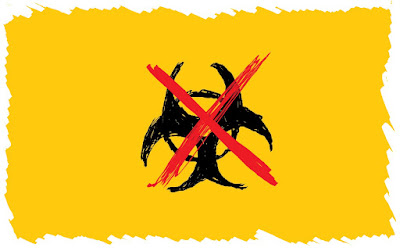There is something insidious about the biological warfare warnings by the Russian and Chinese governments coinciding with acute geopolitical conflict, the Covid-19 pandemic, and the obsession of Western governments and elites with vigilant public health policy.
A US military paper described “public resistance to public health measures” as a military threat to the US preparedness to withstand a biological attack. It is also a threat to US preparedness to launch such a germ warfare attack on an adversary, because it impairs the ability to carry out necessary inoculations of US troops and civilians at home ahead of just such an attack, to avoid the viral weapon backfiring on America.
Inoculation against what, again?
The US government's supposedly defensive Project Bioshield includes the aim of developing vaccines. This makes no sense. Inoculation campaigns would require knowledge of the exact biological threat, both in terms of its identity and the timing of its deployment as a weapon. You would require samples of the specific viral threat to already exist in the lab, to even begin work.
What is Bioshield going to develop a vaccine against, if it doesn't know what the enemy-manufactured virus will be? Inoculations are by definition a preventative measure against a known threat. In a military sense, it is about protecting one's people and resources and preserving them for future action. The development of a military vaccine only seems to make sense if a military is developing an offensive viral weapon and wants to inoculate its own troops to stop the weapon infecting its own forces.
Winning the vaccination debate is a US military objective
The option to impose mandatory inoculations of the population, and especially military forces, is a necessary part of any preparation for biological warfare, whether the attack is to come from an adversary or your own military. The state would necessarily have to forcibly inoculate large parts of its own population, in order to make sure the lethality of its own weapons does not backfire on its people and resources and undermine victory.
Western societies would not simply accept mandatory inoculations without society undergoing the necessary debate over the issue, and we seem to be past that stage now. The intentional politicisation of Covid-19 and very forced attempt to have a public debate over the necessity of mandatory vaccinations (even though the situation was not serious enough for that) could have been preparation to help build offensive biological warfare options against Russia and China. In a way, it is like building nuclear bunkers.
Russians and Chinese spotted something
Then, we come back to the biological weapon claims of the Russians and Chinese, whether one trusts them or not as a source. They allege that the United States has a very aggressive biological warfare program, with facilities near both of these adversary states. They are clearly unnerved, even paranoid. This may be more to do with them noticing Western states apparently hardening themselves for a biological warfare situation at home, taking advantage of the pandemic to overcome any social and political objections to the idea of the sudden inoculation of entire nations on the state's command.
West seems sure of victory
Finally, there is the uncompromising warmongering of Western states, which is uncharacteristic of countries that are held in check by the traditional threat of mutual destruction in a nuclear war. Clearly, Western governments believe they can actually eliminate Russia and China as threats within a short timeframe. This is apparent in their triumphalist attitude, which exceeds their apparent capabilities, as if they intend to lean on indirect or covert means of attack. While many may see the threat in "colour revolutions" (staged uprisings and street violence led by staff at Western embassies), germ warfare also fits such a description. The West talks like it has an ultimate secret weapon, and that weapon could take the form of viruses.
Many of the individuals responsible for advising Western policies (World Economic Forum attendees, for example) have developed an obsession both with pandemics and with enemy regimes at the same time, as if both are certainly on their minds and considerable energy has gone towards both. They also hate alternate sources of information, and especially anti-vaxxers. Their vision is of a society that can live with very harsh public health policies, and also be resolute in its commitment against the "enemy". This is the ideal combination before launching a germ warfare campaign.
Germ warfare preparations failed?
Then again, we can just as easily go back to the US military paper's gloomy conclusion mentioned at the beginning of this post. It may be that anti-vaxxers have ruined everything for them and destroyed their plans.
The extent of rejection of vaccines in Western countries, and official frustrations with much of society's lack of acceptance of harsh health policies, suggest that Western preparations for germ warfare have failed, and our own societies are insufficiently controlled to allow our governments to wage this war. The truth may be that China has a much more compliant population, giving its regime the best capability to both resist biological attacks and launch them.
If Western governments think a biological attack is a viable way to get rid of Russia and China, they are playing with fire. Russia has taken a very aggressive tone since the war in Ukraine started, and would respond brutally to such an attack if it traced it (maybe going straight to nuclear weapons), while China would be able to withstand it and counterattack to deadly effect.

